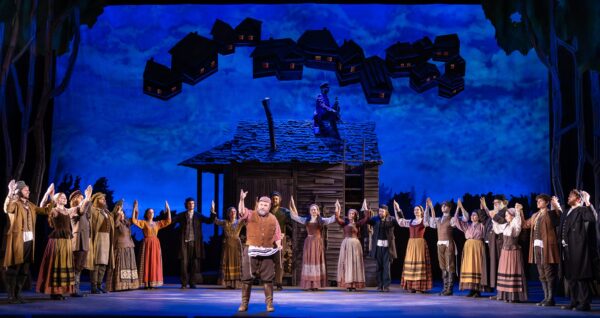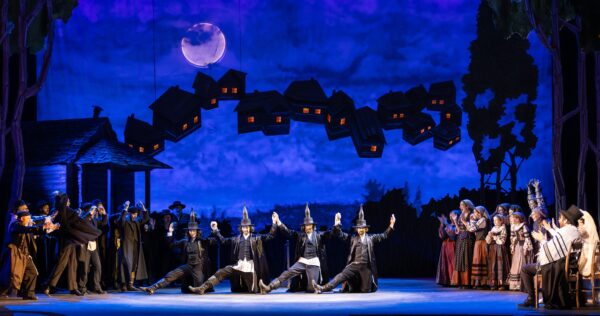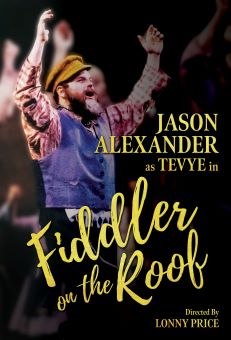JASON ALEXANDER ISN’T FIDDLING AROUND —
HIS POIGNANT PERFORMANCE GROUNDS THIS REVIVAL
In Lonny Price’s revival of Fiddler on the Roof, Jason Alexander’s performance as Tevye stands out as the production’s defining accomplishment. Alexander, well known for his comedic prowess on television, surprises here by sinking into the rich, layered pathos of Tevye — a dairyman whose faith, humor, and frustration become the threads of this complex, resonant tapestry. His Tevye is a man profoundly connected to his traditions, yet reluctantly aware that he must bend to the demands of a world in flux. Alexander’s performance is grounded in an unwavering realness; he captures Tevye’s humanity as much in moments of exasperation as in his moments of tenderness, bringing the role an energy that is as introspective as it is exuberant. His monologues to God are imbued with a subtlety and authenticity that make Tevye feel both like an everyman and an epic figure, one who has been battered by life but refuses to be broken by it.
Jason Alexander
This production, while traditional in approach, subtly refreshes Tevye’s central dilemma — balancing the demands of fatherhood and faith in a village where the ground is rapidly shifting beneath him. Alexander brings an accessible warmth and dignity to the role, underscoring Tevye’s resistance to change without letting him fall into caricature. His portrayal deepens the questions that Fiddler has always posed to its audiences: What happens when the forces of change cannot be resisted? And how does one reconcile a love of tradition with the knowledge that those traditions may no longer sustain the next generation?
 Jason Alexander (center) stars with the company
Jason Alexander (center) stars with the company
Emerson Glick, Rachel Ravel and Alanna J. Smith
Opposite Tevye, stage veteran Valerie Perri brings a formidable yet tender Golde to life. As Tevye’s equal in grit and resilience, her portrayal anchors the show, giving it a steady, believable core that complements Tevye’s moments of uncertainty. Golde’s practical love for Tevye shines through in their understated duet, “Do You Love Me?,” a scene that’s less about romance than it is about survival and commitment. Perri’s Golde is a woman of steely pragmatism and dry humor, one who may not have the luxury of being sentimental, but whose quiet dedication speaks volumes. In this production, this relationship is portrayed as a partnership of necessity, yes, but also of genuine respect and devotion, which gives the show an added layer of poignancy. Their love is less a passion than a steady, enduring partnership — one that is tested and yet holds firm even as their family life spirals into upheaval.
Jason Alexander (far right) with the company "To Life"
Jason Alexander and Ron Orbach
The supporting cast further enhances the production’s emotional depth, with particular strength in the roles of Tevye’s three eldest daughters, played with verve and charm by Rachel Ravel (Tzeitel) Alanna Smith (Hodel) and Emerson Glick (Chava). Their rendition of “Matchmaker, Matchmaker” brings a mix of youthful defiance and longing, as they sing with a zest that both pokes fun at and honors the tradition they are growing restless under. Each daughter embodies a different path of rebellion against arranged marriage: Tzeitel marries for love within the bounds of their faith, Hodel forges a more radical path, and Chava’s choice to marry outside the faith is a seismic shift that leaves a lasting fracture in the family. Together, these women inject an energy that helps capture the larger generational shift sweeping through Anatevka — a world where the old ways are under siege from new ideas of love, autonomy, and social progress.
The company "Sabbath Prayer"
Valerie Perri, Jason Alexander and Gwen Hollander (center) with the company
The young suitors who join Tevye’s daughters in breaking tradition bring equally rich portrayals. Cameron Mabie’s Motel the tailor is earnest and endearing, a man of modest ambition and steadfast loyalty, who represents a version of youthful optimism that quietly pushes back against the notion of marriage as a transaction. Remy Laifer’s Perchik, the radical teacher, embodies the spirit of revolution that’s already sweeping through Russia, challenging Tevye’s authority with a principled conviction while brimming with sexual charisma. And as Fyedka, the Christian suitor of Chava, a tall suitably goyishe-looking Sawyer Patterson brings a warmth and nobility that make him a sympathetic character. Together, these actors provide a robust counterpoint to Tevye’s tradition-bound world, highlighting the generational divide with humor, passion, and a touch of the transgressive.
Cameron Mabie and Rachel Ravel with the company
Ron Orbach’s portrayal of Lazar Wolf, the blustering but vulnerable butcher, is another highlight, and his scenes with Alexander infuse the production with both humor and pathos. Their scene in the bar, as they toast to Lazar’s betrothal to Tzeitel (“To Life”), soon to be dashed by her own desire for Motel, finds both actors in top form. It’s a scene of comic misunderstanding (Joseph Stein‘s unimprovable book continues to amaze) but also of deep cultural insight, reminding us that Fiddler is as much about community as it is about individual resilience. Orbach’s Lazar is both pitiable and endearing, a man of the “old world” who wants to follow tradition but finds himself rebuffed by a younger generation unwilling to settle. Gwen Hollander’s Fruma-Sarah, who appears in Tevye’s surreal “dream” sequence on stilts, is deliciously eerie, her towering apparition both a comic and a cautionary tale that, through her vivid physicality, adds a fantastical dimension to the production. Likewise, Jean Kauffman as Golde’s deceased grandmother, who adds to the otherworldly humor, making the dream sequence one of the production’s most memorable moments.

The Company
Jerry Bock’s score and Sheldon Harnick’s lyrics remain the beating heart of Fiddler on the Roof, with songs that evoke both the joy and heartbreak of Anatevka’s citizens. Under the baton of Alby Potts, the 19-piece orchestra captures the klezmer-inspired melodies with a raw vitality that transports the audience into the soundscape of Eastern European Jewish life. “If I Were a Rich Man” becomes not just a comedic number but an aching anthem for all that Tevye longs to provide for his family. In this well-cast and well-sung production, songs like “Sunrise, Sunset” resonate deeply, grounding the village in an almost mythic sense of time and tradition. Harnick’s lyrics, with their wit and humanity, add a layer of irony and pathos that makes each number feel like a piece of Anatevka’s collective soul. This is music that speaks to anyone who has felt the bittersweet pull of family bonds and the passing of time.
Remy Laifer and Alanna J. Smith
Jason Alexander and Valerie Perri
Price’s decision to hew closely to Jerome Robbins’ original staging lacks the fresh concepts of recent revivals by David Leveaux, Bartlett Sher, or Barrie Cosky, and therefore is bereft of the frankly breathtaking stage images all three productions had. Rather than reimagining Fiddler, Price delivers it as a faithful tribute, letting its power emerge organically through its finely tuned performances and the still-vital score. Anna Luizos’s scenic design, however, uses simple structures on a turntable and atmospheric backdrops, giving Anatevka the texture of a place both grounded in reality and alive in memory. The set’s minimalism lets the performers take center stage, and Japhy Weideman’s lighting design complements this simplicity, shifting between warm, earthy tones and the cooler, foreboding shades that hint at Anatevka’s future.
Jason Alexander and Alanna J. Smith "Far From the Home I Love"
As recreated by Lee Martino, Jerome Robbins’ choreography is still a highlight. In numbers like “Tradition” and “To Life,” the dance acts as a narrative device in itself, expressing the unspoken bonds of the villagers and their shared history. Robbins’ movements, inspired by Eastern European folk dance, elevate the production beyond mere story; the choreography embodies the resilience of a community that dances not just to celebrate, but to assert their place in an indifferent world. These sequences feel as fresh and dynamic as they must have in 1964, underscoring why Robbins’ choreography remains integral to Fiddler’s impact.
Gregory North, Jason Alexander and Valerie Perri (front) with the company
The ensemble cast deserves praise for their ability to convey Anatevka as a close-knit yet diverse community, from Marc Moritz’s affable Rabbi to David Prottas’s nimble Fiddler, who serves as a constant reminder of the precarious balance Tevye and his people must maintain. Their interactions feel genuine and unforced, lending credibility to the idea that this village is a world unto itself — a world now on the brink of destruction.
Jason Alexander, Valerie Perri, Eileen T'Kaye and Ron Orbach
Fiddler remains an exploration of identity, continuity, and change. Alexander’s performance as Tevye is a triumph, breathing new life into a character who, even after six decades on stage, still speaks to our deepest fears and aspirations. As the final notes fade and Anatevka’s villagers prepare to scatter into an uncertain future, this Fiddler leaves us contemplating our own future under the incoming quasi-authoritarian Trump administration. Through its humor, heartache, and unflinching exploration of tradition and transformation, this production reminds us why Fiddler on the Roof endures: it speaks to the human spirit, finding strength in fragility and hope in despair.
Jason Alexander and David Prottas
photos by Jason Niedle/TETHOS
Fiddler on the Roof
La Mirada Theatre for the Performing Arts
& McCoy Rigby Entertainment
14900 La Mirada Blvd. in La Mirada
Wed at 7:30 (Nov. 27); Thurs at 7:30 (dark Nov. 28); Fri at 8; Sat at 2 & 8; Sun at 1:30 & 6:30
ends on December 1, 2024
talkback with cast on Nov 14 at 7:30 and Nov 27 at 7:30
for tickets, call 562.944.9801 or visit La Mirada Theatre

